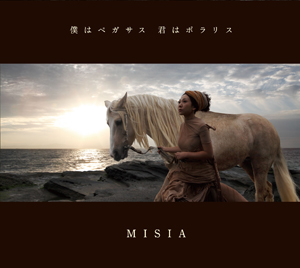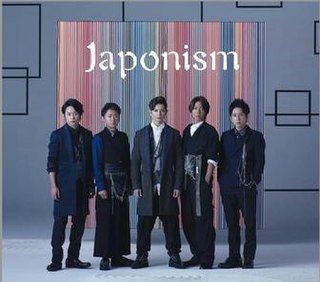
Tomoyasu Hotei, also known simply as Hotei, is a Japanese musician, singer-songwriter, composer, record producer and actor. With a career spanning more than 40 years, Hotei claims record sales of over 40 million copies and has collaborated with acclaimed artists from around the world. Hotei first rose to prominence in the 1980s as the guitarist for Boøwy, one of Japan's most popular rock bands, before starting a solo career.

Boøwy was a Japanese rock band formed in Takasaki, Gunma in 1981. The classic lineup of vocalist Kyosuke Himuro, guitarist Tomoyasu Hotei, bassist Tsunematsu Matsui, and drummer Makoto Takahashi reached legendary status in Japan during the 1980s.

"Luv Parade/Color of Life" is the fifteenth single by Japanese recording artist Misia. It was released on July 5, 2006 as the first single from Misia's seventh studio album Ascension.

"Flying Easy Loving Crazy" is a song recorded by Japanese singer-songwriter Toshinobu Kubota and Japanese singer Misia for Kubota's fifteenth studio album Timeless Fly. It was released by Mastersix Foundation as the album's second single on March 26, 2008.

"Aitakute Ima" is a song recorded by Japanese singer Misia, from her ninth studio album, Just Ballade. It was released by Ariola Japan as the album's sixth single on November 18, 2009. "Aitakute Ima" is the theme song to the first season of the TBS drama series Jin.

"Hoshi no Yō ni..." is a song recorded by Japanese singer Misia, from her ninth studio album, Just Ballade. It was released simultaneously with the album on December 16, 2009, through Ariola Japan. "Hoshi no Yō ni..." is the theme song to the kaiju film Mega Monster Battle: Ultra Galaxy.

"Kioku" is a song recorded by Japanese singer Misia for her tenth studio album, Soul Quest. It was released as the album's lead single by Ariola Japan on May 25, 2011. "Kioku" is the theme song to the EX drama series Iryū Sōsa, starring Takaya Kamikawa.

New Battles Without Honor and Humanity, also known as Another Battle, is a 2000 Japanese yakuza film directed by Junji Sakamoto. It is a remake of Kinji Fukasaku's Battles Without Honor and Humanity series from the 1970s, which were adapted from a series of newspaper articles by journalist Kōichi Iiboshi, that were rewrites of a manuscript originally written by real-life yakuza Kōzō Minō while he was in prison.

"Koi wa Owaranai Zutto" is a song recorded by Japanese singer Misia. It was co-written by Misia and Jun Sasaki and produced by Misia. "Koi wa Owaranai Zutto" was released as a single simultaneously with the Tour of Misia Japan Soul Quest concert DVD on June 20, 2012, through Ariola Japan. The title track served as theme song for the NHK drama series Hatsukoi, starring Yoshino Kimura.

"Deepness" is a song recorded by Japanese singer Misia. It was co-written by Misia and Jun Sasaki and produced by Misia. "Deepness" was released as a single by Ariola Japan on November 7, 2012. It is the theme song to the TBS drama series Ōoku: Tanjō - Arikoto / Iemitsu-hen, starring Masato Sakai and Mikako Tabe.

"Saraba, Itoshiki Kanashimitachi yo" is the 9th single by the Japanese female idol group Momoiro Clover Z, released in Japan on November 21, 2012. The title track became the group's first song to top the Billboard Japan Hot 100 chart.

"Boku wa Pegasus Kimi wa Polaris" is a song recorded by Japanese singer Misia for her eleventh studio album New Morning. It was released as the album's second single by Ariola Japan on February 5, 2014. The title track was released digitally and serviced to radio two weeks prior, on January 22, 2014. It is the theme song to the TBS drama series S Saigo no Keikan, starring Osamu Mukai and Gō Ayano. Misia first performed "Boku wa Pegasus Kimi wa Polaris" on January 18, 2014 at Nippon Budokan during the Hoshizora no Live VII concert tour.

New Morning is the eleventh studio album by Japanese singer Misia. The album was released by Ariola Japan on April 2, 2014, the same day as the 77th and final date of Misia's nationwide Hoshizora no Live VII: 15th Celebration concert tour, at the Bunkamura Orchard Hall, which was broadcast live on YouTube. The album yielded the singles "Shiawase o Forever" and "Boku wa Pegasus Kimi wa Polaris". The lead track "Hope & Dreams" was released as a promotional single for the album.

"Shiroi Kisetsu" is a song recorded by Japanese singer Misia, from the album Love Bebop. It was released as the album's lead single digitally on February 4, 2015, through Ariola Japan. It was released as a limited double A-side CD single alongside the song "Sakura Hitohira" a week later, on February 18, 2015. The song was co-written by her0ism and Yuuki Idei, and arranged and produced by her0ism. The song is featured as theme song on the soundtrack of the EX drama series Second Love starring Kazuya Kamenashi and Kyoko Fukada. The limited physical release includes a piano rendition of "Shiroi Kisetsu" as a hidden track.

"Shiawase o Forever" is a song recorded by Japanese singer Misia, from her eleventh studio album New Morning. It was released as the album's lead single by Ariola Japan on September 4, 2013. The song was used in a promotional campaign and televised commercials for the bridal magazine Zexy, starring thirty owarai comedians and Airi Matsui.

Japonism is the fourteenth studio album of the Japanese idol group Arashi. The album was released on October 21, 2015 under their record label J Storm in three editions: a first press/limited edition, a Yoitoko limited edition, and a regular edition. The first press edition comes with an 84-page photo lyrics booklet and bonus DVD with the music video and making-of for the album's lead track, "Kokoro no Sora". The Yoitoko limited edition comes with a 32-page lyrics booklet, and the regular edition comes with a 36-page lyrics booklet. The album sold over 820,000 copies in its first week and topped the Oricon charts for two consecutive weeks. With more than 1,000,000 copies sold, the album was certified for Million by the Recording Industry Association of Japan (RIAJ). On December 23, 2015, Oricon ranked Japonism as the best-selling album of 2015 in Japan. On February 27, 2016, Japonism was awarded Album of the Year in the 2016 Japan Gold Disc Awards.

"Kimi no Soba ni Iru yo" is a song recorded by Japanese singer Misia. It is the theme song of the 2017 Warner Bros. Pictures live action film Fullmetal Alchemist. The song was written by Misia, with lyrics that portray the brotherly bond between the two main characters, Edward and Alphonse, and composed by Los Angeles–based Japanese musician Ichi, and Mayu Wakisaka.

"Sakura Hitohira" is a song recorded by Japanese singer Misia, from the album Love Bebop. It was released as the album's second single digitally on February 11, 2015, through Ariola Japan. It was released as a limited double A-side CD single alongside the song "Shiroi Kisetsu" a week later, on February 18, 2015. The song was written by Misia, composed by her0ism and Shirose, from the band White Jam, and arranged and produced by her0ism. It was written specifically for the three-night TX drama The Eternal Zero, adapted from the film by the same name and starring Osamu Mukai, for which it serves as theme song.

"Ai no Katachi" is a song recorded by Japanese singer Misia, featuring Hide from Greeeen on the chorus backing vocals. It was released digitally by Ariola Japan on July 31, 2018, while the physical single was released on August 22, 2018. The song was written and composed by Greeeen and produced and arranged by Seiji Kameda. It is the theme song of the TBS drama series Gibo to Musume no Blues.
"Life Goes On" is a song recorded by Japanese-American singer-songwriter Ai, released on August 3, 2023, by EMI Records. Produced by Tomoko Ida, the song serves as the image song for the Japanese film Haru ni Chiru.



















